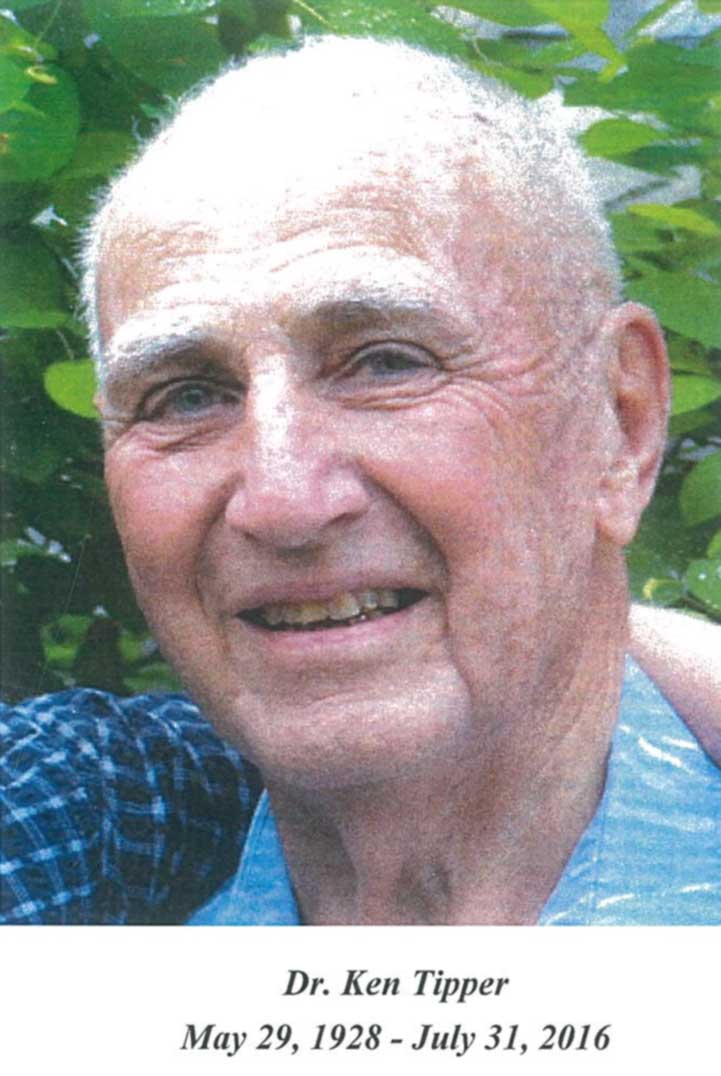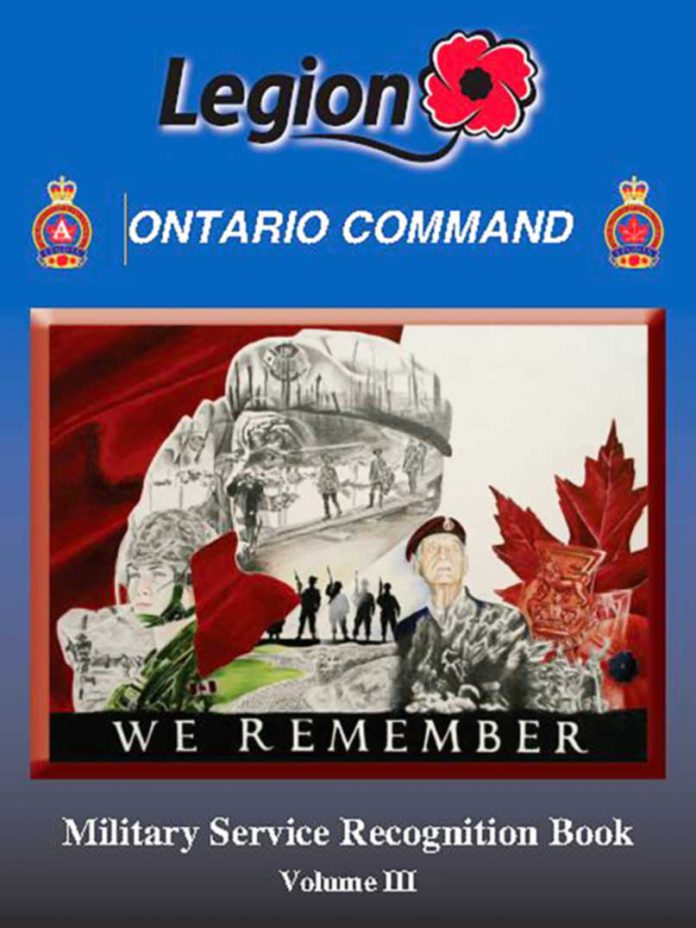A gentle giant cast very much in the mould of James Herriot
Veterinarian Dr. Ken Tipper was a big man, in every sense of the word, and throughout his long life and practice on Manitoulin Island “Dr. Ken” played an important and central role in the community, both in his practice and in his commitment to volunteerism.
Born in Huntsville, Dr. Tipper studied his craft at the University of Guelph, but it was in Toronto that he received his accreditation as a veterinarian.

“That is how they did it in those days,” explained veterinarian Dale Scott, who worked with Dr. Tipper for 15 years and became a close friend as well as a colleague of Dr. Tipper. “He did go to Guelph, but the licensing was done in Toronto.”
Dr. Tipper’s first practice was in Massey, where he met Marion, the love of his life and the woman who was to become his lifelong partner, both as wife and in his practice.
“She worked at the store of a good friend,” said Dr. Tipper’s son Sean. “They had actually known each other for a long time.”
The couple moved to Sturgeon Falls and North Bay, where son Sean was born, and Dr. Tipper set up practice in those communities before moving to Manitoulin Island in 1961, shortly after the previous veterinarian who had served the community retired.
Dr. Tipper was a very tall and well built individual when he first arrived on the Island, his fitness set him apart from his predecessor. “I never knew him to take a day off sick,” said Dr. Scott as he recalled stories about the earliest days of Dr. Tipper’s practice on Manitoulin.
The previous veterinarian had been quite ill for several years before retiring. He would insist that the calves and cattle that he was inoculating be tied up securely before he would approach to give a needle. “Perhaps he had been kicked before,” suggested Dr. Scott. In any event, “when Dr. Ken showed up at the first farm where he had to give a steer an injection, the farmers were there holding a rope. He asked what the rope was for and they told him,” said Dr. Scott. “He just said ‘oh never mind that,’ jumped into the pen, put the steer in a headlock and gave it the injection. ‘There, that takes care of that’.” It was a scene that was to be repeated many times over the next few years. “He was a big, strong guy,” said Dr. Scott.
When your practice deals primarily with large animals, it seems a little personal beef goes a long way.
Dr. Tipper took his practice and serving the farm community very seriously. It was very much his passion.
“He had a telephone on the dining room table,” said Dr. Scott. “It was a rare meal that a phone call did not come in.”

“I remember one night, around 2:30 in the morning, a cow was having trouble calving,” recalled long-time family friend and client Lyle Dewar. “Marion answered the phone and said ‘I’ll go get him.’ He was sleeping in the bathtub.” Dr. Tipper spent many a short night’s nap in that tub over the 57-odd years of his practice and it was just one of the legends surrounding a man with a “fire station practice,” so-called in the field because small one-man operations in rural areas tend to be characterized by the practitioner racing from one crisis call to the next.
Luckily, Dr. Tipper had a few folks looking out for him.
“There were no cell phones in those days, most of the time things were being done on a party line. There was a woman named Jean Irving who was handling his calls,” recalled Dr. Scott. “Farmers would think nothing about calling in around six or seven in the morning, when they were first up with the cows and had headed back into the house,” he said. “She would know that he had been out all night looking after a call and Jean would give them a blast and tell them to call back at a civilized hour.”
After working all day in the clinic, Dr. Tipper still had a full day’s work ahead of him, noted Dr. Scott. “There were the orders for medications to place and the billing that had to be sent out,” he said.
Dr. Tipper’s wife Marion was very involved in that part of the business as well. “You can’t not mention Marion,” was a refrain heard from all quarters in researching the popular veterinarian’s life. “She worked very hard in the practice as well,” noted Mr. Dewar.
“Marion would know most of the farmers by name, but there was the odd one that she wasn’t sure of,” said Dr. Scott. “In those days most of the farms had their names on the truck that they would drive in. This one time she suddenly realized that she wasn’t sure who had just come in to pick up drugs for their cattle. She ran upstairs to look out to see the truck before it pulled out of the drive onto the highway. It wasn’t on the truck. It took a few weeks to finally nail down who the bill should go to.”
Island names also caused a bit of consternation at times. “Horace Moore and Morris Hore are names that could challenge just about anybody to keep straight,” laughed Dr. Scott.
Somehow, despite the long hours and fire station calls at all times of the day or night, Dr. Tipper still found time to be very involved in his church and community. He served as a church warden for St. Francis of Assisi Anglican Church in Mindemoya, the Manitoulin Hospital board, the Mindemoya School Board, the Cambrian College board, Manitoulin Non-profit Homes, Central Manitoulin municipal council, as well as judging animals at the Central Manitoulin fall fair.
He was also very dedicated to his family, showed interest in their academics, athletics, would play cards and board games with them and was a regular in the audience at local school plays. Dr. Tipper loved to fish with “his boys” and always carried a fishing pole in the vehicle while out on call in case an opportunity to cast a few lines presented itself.
Knowing his incredible schedule, which would have been a drain on any two normal persons, it is easy to understand how Dr. Scott came to give a very significant donation to St. Francis one Sunday.
“They were counting up the collection after mass one Sunday when they found my paycheque was in the collection plate,” recalled Dr. Scott. “Dr. Ken was the warden at the time and he suggested gently that perhaps ‘Dale didn’t intend to put that much in.’ I think he had mixed up my paycheque with the church donation that Sunday.” It all got sorted out fairly in the end.
Dr. Tipper also raised a bit of livestock himself, along with some horses.
“A mysterious foal appeared in the field one day,” recalled Dr. Scott. “He had been keeping an eye on one mare that was pregnant, but it wasn’t hers.” Although the mystery of the foal’s progenitor was never solved, Dr. Tipper’s sense of humour came out in the new addition’s name “Alpo” (Alpo was the name of a popular dog food at the time).
Dr. Tipper was a true gentleman according to all that knew him, a real gentle giant, and living up in a rural area gave him a trusting and forgiving nature.
“He was having dinner in a restaurant one day and when he came out, his truck had mysteriously disappeared,” recalled Dr. Scott. “He looked around and couldn’t see it, but all of the boxes of medication were stacked in the parking lot where his truck had been. It was expensive stuff.”
Dr. Tipper called for his wife to come and get him, which took quite a bit of time, and then the couple tried to think of what might have happened. “They didn’t even call the police right away,” said Dr. Scott. “On the way home the truck passed them headed in the other direction.”
The couple gave chase and eventually the truck was found abandoned in the ditch, little worse for wear.
It seems a trio of youngsters, aged nine or 10, had determined to go on a joy ride. It was later figured out that they had happened upon Dr. Tipper’s truck in the parking lot with the keys in the ignition. “Dr. Ken never bothered to take the keys out,” said Dr. Scott. “Dr. Ken thought it was pretty funny—the little guy could barely see over the steering wheel.” Of course it helped that there was no damage to the vehicle when all was said and done.
There were plenty of lean times to be found in farm operations over the years and plenty of times Dr. Tipper’s fees were paid with a sack of potatoes, a few roasts or some other produce from the land.

photographs of Dr. Tipper at his work. “As a large animal vet I don’t think people would really want to see pictures of what he did in his work,” laughed his son Sean.
“He was always very aware of the poverty of the people that he served,” said Dr. Scott. “He always bought the same make, model and colour of car, a Dodge Fury, black, that he would immediately drive up a dirt road and get the car dirty, so that people didn’t think he was getting rich off of them. For 15 years or more, people never knew he had a new vehicle.”
“A lot of times he didn’t charge what he was supposed to,” said Mr. Dewar.
“His rates were a lot lower than those set by the industry,” agreed Dr. Scott.
A recent accidental conversation that came about in researching this article illustrates just how pervasive Dr. Tipper’s reputation on Manitoulin remains to this day. A misdialed number connected The Expositor to someone other than Mr. Dewar, in normal Island fashion, a short conversation ensued where the individual on the line learned that the reporter was researching Dr. Tipper. The person on the other end responded with “he was a wonderful man” and proceeded to relay his own experiences as a farmer who depended on Dr. Tipper’s services.
“He did it because he loved his job and he loved the people he worked with,” said Dr. Scott. It is little wonder that he was so beloved to the community he served.





